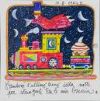|
ESL Forum:
Techniques and methods
in Language Teaching
Games, activities
and teaching ideas
Grammar and
Linguistics
Teaching material
Concerning
worksheets
Concerning
powerpoints
Concerning online
exercises
Make suggestions,
report errors
Ask for help
Message board
|
ESL forum >
Concerning worksheets > let ´s talk about CLIL
let ´s talk about CLIL
|

donapeter

|
let ´s talk about CLIL
|
|
Dear users, Let �s talk about what is CLIL, if CLIL is an ESL resource and if we teach/don �t teach it and why.
I have students, between 11 and 16 ( private students- at school I teach to 15- 55)and I have been teaching them Eng for 4-5 years now. I need different topics as the old, common ones are already known. So...I have lessons about plants, animals, anatomy, music and other non-ordinary-English-resources related. This is why I posted a lesson about PLANTS, last week. Terms like root, stem and seeds are not scientific words or technical words. It �s the common sense to teach such things as one can meet such words in movies, cartoons and everyday life. PS - I don´t understand the ones who consider an ESL resource a simple diploma( two words in English and an image) but they consider such a topic (CLIL) non ESL resource.
|
27 Jan 2010
|
|
|
|

Yulia Mo

|
Dear Donapeter!
I already answered you, but i wanted to add something here. I think part of this question should go back to Victor, who made the rules for us to follow. I personally (don �t anyone take any offense) don �t consider diplomas and certs ESL resources, but according to the rules it has to stay. On the other hand, resources like the one reported today are in fact not ESL, but science, and according to the official rules it �s supposed to go. Now i �m just talking about the rules. Am i wrong here? So on these two wss that you mentioned i voted with this in mind.
Again i personally consider that plants wss useful, as i myself have a private student who i teach all the subjects she takes in English, science included, and just last term she had exactly this topic. Yes it would be useful for me. But this is not ESL.
By the way, terms like stem and seeds are quite common, but the wss you mentioned also contained some scientific terms like vascular for instance. But this isn �t the topic we are discussing here.
Please, let �s not argue. As i understand this topic opened partially because of me (or totally because of me). I didn �t want to create another fight on the site. I just expressed my opinion.
Hugs to all, Yulia.
|
27 Jan 2010
|
|
|

Zora

|
Hi there Dona :)
I completely agree with you. Moreover, I think these type of worksheets provide a very practical way to learn a language. In fact, they are probably just, or more, usual as a poem or a story... because they provide a "real" situation where the vocabulary is used.
I always vote for these type of worksheets to stay. Even some of the Math ones are good. I especially like the problem solving ones. 
|
27 Jan 2010
|
|
|

aliciapc

|
|
Just to help you Dona, these sites may contribute to your work.
On the other hand, this is a GREAT site the way it is !! I think that maybe there are more "simple" resources because clil ones are more elaborated and not so easy to prepare .
Here are the links, hope they are useful !!
|
27 Jan 2010
|
|
|

JulietaVL

|
|
Those who do not consider certificates as ESL resources allowed in this site, I recomment them to read this:
|
27 Jan 2010
|
|
|

aliciapc

|
|
Julieta, they are so right !! To teach well one has to motivate and what better motivation for kids especially, than "awards" like the ones in this site ?? I find they are too young to learn intrinsically so stickers motivation is necessary ! |
27 Jan 2010
|
|
|

donapeter

|
thanks for all your answers and for the sites too!! I do not use motivational stickers or diplomas as my students at school are not the type!!! A good cigarette or a good mark ( which is not deserved...but anyway they ask for it) or a big box of chocolates are the real things that can motivate them............ a little!!!!  I appreciate everybody �s work, this is why I am still here, an active member!
Thanks again for all your answers!
D |
27 Jan 2010
|
|
|

ELOJOLIE274

|
Hi,
I don �t want to argue with anyone, and i just want to talk about what students can learn in my country, France.
High School students who want to specialize in English have the fantastic opportunity to choose to learn English outside the English class: indeed some French High Schools offer their students physics classes, history classes, or biology classes in English in what we call "European classes". Obviously, there is a partnership between the English teacher and the Physics/biology... teacher. Last year pupils in my high school had the opportunity to study in a European class, and they really improved his English because they could work on their favourite subject (physics and chemistry) in English, learning new words that will be useful in a few years when they finish high school and go to university...
so I think that a text about physics... should be considered as an ESL resource if it contains a couple of tasks whose aims are to improve both our pupils � English and their knowlegde of another subject...
Victor, do you agree?
|
27 Jan 2010
|
|
|

maoopa

|
|
I do not want to add to the controversy, but our subject is wonderful because it allows us to teach a wide range of topics. Doesn �t a learner of English need to learn the vocabulary of science? I not only think they do, I experience that everyday with my pupils... even (and mostly) the advanced words.
Dona, I so agree with you.
Best regards to all,
Mauro
|
27 Jan 2010
|
|
|

kmtr

|
|
I would just like to add that here in K-12 schools in North Carolina, United States my state curriculum of ESL standards are 5 broad ones: the language of mathematics, the language of science, the language of social studies, the language of language arts and social/instructional language. (These are from an organization called WIDA and are pretty interesting if you want to check it out http://www.wida.us/standards/elp.aspx). Many states are adapting these as common standards. To teach ESL, I am supposed to (and I personally believe, like many of you, that content is the best vehicle with which to naturally learn language) teach the language needed to be successful in those content classes. Since I am not a science or math specialist, I am always looking for helpful ELL-friendly resources!
(also- what does the acronym CLIL stand for?)
THANKS!! |
27 Jan 2010
|
|
|

Lancillotta:

|
|
Hi,
CLIL stands for Content and Language Integrated Learning.
Regards
Sabrina |
27 Jan 2010
|
|
1
2
Next >
|